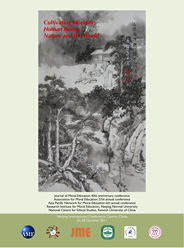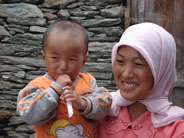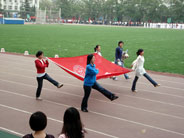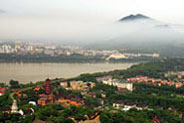AME Kohlberg Memorial Lecture 2011
Learning to be Human: the Confucian Way of Moral Reasoning
TU Weiming, Harvard University, USA and Peking University, P. R. China
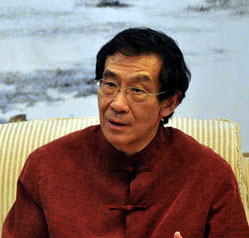 TU Weiming is the Harvard-Yenching Professor of Chinese History and Philosophy and of Confucian Studies at Harvard University, USA and Senior Professor of Philosophy at Peking University, China. He has been a fellow of the American Academy of Arts and Sciences since 1988. Professor TU has been instrumental in developing discourse on dialogue among civilisations, being a proponent of the idea of 'Cultural China' (which attempts to understand what it means to be Chinese within a world context), and by reflection on the Enlightenment mentality of the modern West, and theories of multiple modernity. He has authored two monographs and several collections of essays in English. TU Weiming's five-volume collected works in Chinese was published in 2001. He is currently studying the modern transformation of Confucian humanism in East Asia and tapping its spiritual resources for human flourishing in the global community.
TU Weiming is the Harvard-Yenching Professor of Chinese History and Philosophy and of Confucian Studies at Harvard University, USA and Senior Professor of Philosophy at Peking University, China. He has been a fellow of the American Academy of Arts and Sciences since 1988. Professor TU has been instrumental in developing discourse on dialogue among civilisations, being a proponent of the idea of 'Cultural China' (which attempts to understand what it means to be Chinese within a world context), and by reflection on the Enlightenment mentality of the modern West, and theories of multiple modernity. He has authored two monographs and several collections of essays in English. TU Weiming's five-volume collected works in Chinese was published in 2001. He is currently studying the modern transformation of Confucian humanism in East Asia and tapping its spiritual resources for human flourishing in the global community.
Plenary Speakers
Moral Education within Difference: Impediments to Appreciating the Moral Other
Dwight BOYD, University of Toronto, Canada
This paper is motivated by two related beliefs: (1) that the human condition is not one of just commonality, but also inevitable difference and conflict; and (2) that an essential function of morality is to promote the possibility of people getting along with each other within this context. The paper then focuses on three impediments that can plague moral understanding across difference. These impediments are identified as 'Epistemological Closure', 'Cultural Arrogance', and 'Relations of Oppression'. Philosophical arguments will be given to show how each functions to block our authentic appreciation of the other and how moral education might be conceptualised to counter the impediment. Throughout, two meta-assumptions will permeate my reflections: (1) the relevance of my own social location; and (2) the 'good' of critical self-reflexivity.
 Dwight Boyd is Professor Emeritus of Philosophy of Education in the Department of Theory and Policy Studies in Education at the University of Toronto, Canada, having taught in this Program from 1975 to 2008. His teaching and research has focused on moral and political issues in the context of moral education, gender and education, and cultural and racial difference in education. He has published numerous papers pertaining to these issues in journals such as the Journal of Moral Education, Harvard Educational Review, and Educational Theory. He was Assistant Editor of the Journal of Moral Education (1981-1996), and served as President of the Ontario Morals/Values Education Association, the Philosophy of Education Society, and the Association for Moral Education, receiving from the latter the Kuhmerker Award for distinguished contribution and service to the field of moral education.
Dwight Boyd is Professor Emeritus of Philosophy of Education in the Department of Theory and Policy Studies in Education at the University of Toronto, Canada, having taught in this Program from 1975 to 2008. His teaching and research has focused on moral and political issues in the context of moral education, gender and education, and cultural and racial difference in education. He has published numerous papers pertaining to these issues in journals such as the Journal of Moral Education, Harvard Educational Review, and Educational Theory. He was Assistant Editor of the Journal of Moral Education (1981-1996), and served as President of the Ontario Morals/Values Education Association, the Philosophy of Education Society, and the Association for Moral Education, receiving from the latter the Kuhmerker Award for distinguished contribution and service to the field of moral education.
Moral Education as 'InnerOuter' Environmental Education: an Asian Philosophical Contribution
Heesoon BAI, Simon Fraser University, Canada
Dominant public and academic discourse has us think and talk about moral education, health education, environmental education and contemplative education as separate spheres of concern and influence, even as we promote interdisciplinarity. I wish to bring to this discourse an Asian philosophical perspective (based on Buddhism and Daoism) from which I critique the dualistic thinking (the legacy of the dominant Western philosophical tradition) that separates these four spheres. I show how these should and can converge and integrate, and why this integration is crucial and urgent in the light of worldwide and escalating destruction and suffering. In particular, the key understanding I wish to share in my work from an Asian philosophical perspective is that 'virtue' (德 as moral agency) is 'power' (德 as transformative agency) and this kind of power emerges from the self-cultivation of aligning and integrating body-mind-heart-spirit.
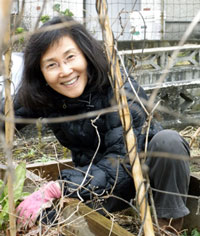 Heesoon Bai is an Associate Professor in Philosophy of Education at Simon Fraser University, Canada. She is committed to the resurgence of Philosophy in Education, and has been actively fostering a philosophic culture through her teaching, graduate supervision, and research. Her work in education is particularly known for its East-West dialogue scholarship. Her research interests include ethics and moral education; epistemology, ontology, and consciousness studies; ecology and environmental education; and Asian philosophies. She served (2007-2010) as Director in Graduate Studies in Education at SFU, and the Editor (2005-2010) of Paideusis, Journal for the Canadian Philosophy of Education. She is a recipient of the Simon Fraser University Excellence in Teaching Award (2003) and Canadian Committee for Graduate Students in Education Mentorship Award (2008).
Heesoon Bai is an Associate Professor in Philosophy of Education at Simon Fraser University, Canada. She is committed to the resurgence of Philosophy in Education, and has been actively fostering a philosophic culture through her teaching, graduate supervision, and research. Her work in education is particularly known for its East-West dialogue scholarship. Her research interests include ethics and moral education; epistemology, ontology, and consciousness studies; ecology and environmental education; and Asian philosophies. She served (2007-2010) as Director in Graduate Studies in Education at SFU, and the Editor (2005-2010) of Paideusis, Journal for the Canadian Philosophy of Education. She is a recipient of the Simon Fraser University Excellence in Teaching Award (2003) and Canadian Committee for Graduate Students in Education Mentorship Award (2008).
It's Not Me, It's My Brain: Cultivating Moral Learning in an Age of Neuroscience
Derek SANKEY, University of Sydney, Australia
The plea of criminal insanity assumes that the 'insane' lack the freedom to choose what they do and the awareness of what motivates their actions. But this will change as we enter an 'age of neuroscience'. Increasingly, what we all think and do will be said to result not from conscious free choice, but rather our brain and its biology; much of which occurs below the level of conscious awareness. These claims not only impact law, but also the cultivation of moral learning. This presentation will consider and give examples of the nature and implication of these claims, arguing that the lack of conscious control does not imply lack of any control, which would undermine the attempt to cultivate moral learning. Rather, an age of neuroscience invites us to reappraise what we mean by cultivating morality and suggests urgency in reinstating moral learning into mainstream education; especially in early childhood and adolescence.
 Derek Sankey combines a career-long commitment to improving teacher education with a lifelong interest in the interface between the natural sciences and the humanities. In the UK he was a pioneer of school-based teacher education. His academic background is in philosophy of science, with a particular focus on cosmology and the science of mind and brain. He gained his PhD at London University, Institute of Education, where he was employed from 1986-1995. Previously he had directed a project for the Farmington Institute, Oxford on the teaching of science and the humanities. He worked at the Hong Kong Institute of Education from 1995-2006, establishing a centre for learning studies, and then at Seoul National University, before moving to Australia in 2010. Over the past 10 years, his research has progressively focused on the application of complexity (dynamic systems) theory to the notion of the human self and its education.
Derek Sankey combines a career-long commitment to improving teacher education with a lifelong interest in the interface between the natural sciences and the humanities. In the UK he was a pioneer of school-based teacher education. His academic background is in philosophy of science, with a particular focus on cosmology and the science of mind and brain. He gained his PhD at London University, Institute of Education, where he was employed from 1986-1995. Previously he had directed a project for the Farmington Institute, Oxford on the teaching of science and the humanities. He worked at the Hong Kong Institute of Education from 1995-2006, establishing a centre for learning studies, and then at Seoul National University, before moving to Australia in 2010. Over the past 10 years, his research has progressively focused on the application of complexity (dynamic systems) theory to the notion of the human self and its education.
The Moral Predicament and Moral Education in Contemporary China
WAN Junren, Tsinghua University, P. R. China
Much attention has been paid to the rapid and powerful economic growth in China over the last 30 years while not enough attention has been paid to the simultaneous environmental, ecological, cultural and moral costs. I consider that as a moral predicament or moral crisis in Chinese society today. Moral education should play an extremely important role in improving such a situation. Rather than looking to a traditional Confucian idea of society and moral education, I offer a social transformative analysis of the moral phenomenon confronting China and global society. Inspired by the works of Max Weber, Jurgen Habermas and Alasdair MacIntyre, I will try to justify the inescapability of, and thus the highest demands for, a new moral education in contemporary China. I take the crisis in social ethical trust, regarded as the most serious moral predicament in China today, as an example. After that moral pathological diagnosis, I will argue that a new moral education should be based on a plurality of value resources and approaches.
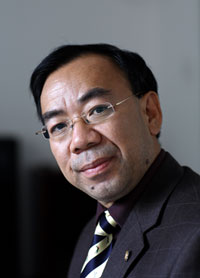 WAN Junren is Professor of Ethics and Political Philosophy at Tsinghua University, Beijing, P. R. China and Chairman of the China Ethics Association. He has been honoured with many professorships in China and abroad. He is the author of more than 160 articles in both Chinese and English. His books include An Ethical Critique of Modernity, Ethical Discourse of Modernity; Search for a Universal Ethics; Moral Dimension: An Introduction to Economic Ethics; Contrasts and Perspectives: A Comparative Study of Western Ethics and Chinese Ethics; We Are All Near to Our God, and the two-volume work, A History of Contemporary Western Ethics. WAN Junren has translated a number of philosophical works into Chinese including: Selected Readings of John Rawls, Political Liberalism by John Rawls, Three Rival Versions of Moral Inquiry and Who's Justice? Which Rationality? by Alasdair MacIntyre, and the Selected Writings of William James. He is a member of the standing committee of the Beijing Ethics Society and a member of the editorial boards of The Journal for Confucian Studies, The Journal of Open Times, The Journal of Tsinghua University and The Journal of China Scholarship.
WAN Junren is Professor of Ethics and Political Philosophy at Tsinghua University, Beijing, P. R. China and Chairman of the China Ethics Association. He has been honoured with many professorships in China and abroad. He is the author of more than 160 articles in both Chinese and English. His books include An Ethical Critique of Modernity, Ethical Discourse of Modernity; Search for a Universal Ethics; Moral Dimension: An Introduction to Economic Ethics; Contrasts and Perspectives: A Comparative Study of Western Ethics and Chinese Ethics; We Are All Near to Our God, and the two-volume work, A History of Contemporary Western Ethics. WAN Junren has translated a number of philosophical works into Chinese including: Selected Readings of John Rawls, Political Liberalism by John Rawls, Three Rival Versions of Moral Inquiry and Who's Justice? Which Rationality? by Alasdair MacIntyre, and the Selected Writings of William James. He is a member of the standing committee of the Beijing Ethics Society and a member of the editorial boards of The Journal for Confucian Studies, The Journal of Open Times, The Journal of Tsinghua University and The Journal of China Scholarship.


